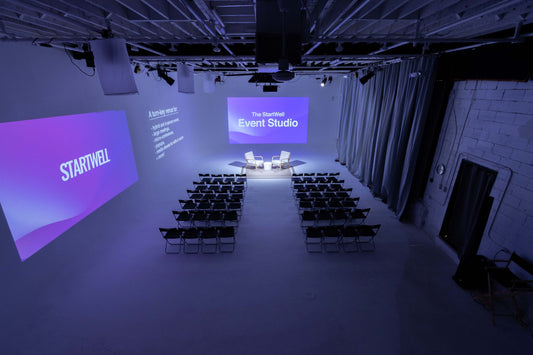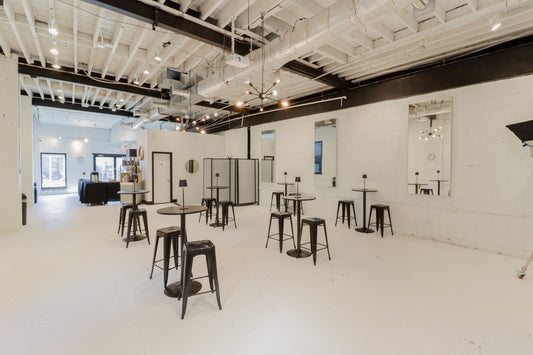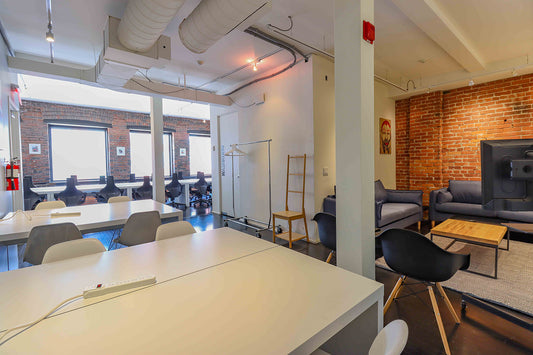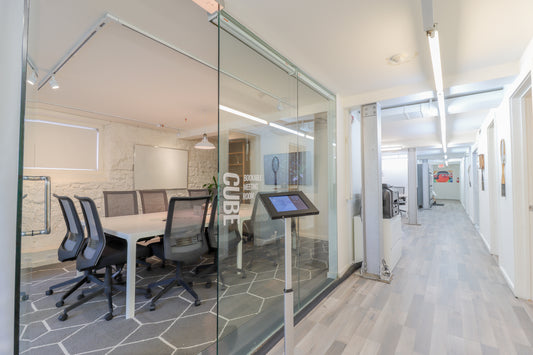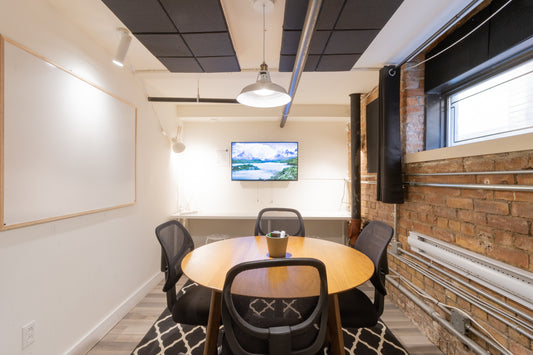Emma Hunt is a senior talent advisor with Bloom - a workplace design consultancy based in Toronto but with a globally dispersed team.
Bloom runs training for internal and external recruiters and hr professionals on topics like Diversity and Equity Inclusion and in this episode of StartWell's Gathering series Emma shares her perspectives on all sorts of topics to do with the evolving responsibilities of hr professionals.
Spend time with this conversation - here's the full transcript
Workplace design consultancy and DEI training
Qasim Virjee 0:11
So welcome back to the gathering podcast by start well, where we kind of examine this new working reality that everyone is in it is the year 2022. And it's almost 2023 cars drive themselves. And it apparently they don't do a great job of it yet. But that's about to change. Maybe not as Elon Musk's taking his attention to yet another venture. Regardless, today. This is the 11th or 12th podcast. Oh my god. What is it? This is the 12th podcast in the gathering series. And today I'm in studio with Mr. Hunt from loom. Ella, thanks for joining me.
Emma Hunt 0:53
Yeah, no worries, thank you for having me. It's funny, you talk about self driving cars, I was reading that the Jetsons was in 2023 or 2022. That's when the Jetsons are supposed to be so they had really ambitious goals for us at this point that we haven't lived up to. No, we
Qasim Virjee 1:11
have not in the last couple decades. Humanity is really you know, taking back seats, innovation. Innovation that helps people, but anyway, well, Bloom, let's talk about what Bloom is because from the tagline, which is no, I'm not even gonna go there. I'm not gonna sell your company to you. You sell it to me, what is bloom do? Yeah,
Emma Hunt 1:36
so, Bloom is a workplace design consultancy. So we have a couple of different streams in the company in terms of what we do. But essentially, we want to help make better workplaces. So one of those streams is diversity, equity and inclusion. So we actually run training for both individuals and companies for Dei, we've worked with a lot of different companies in that space, like, you know, less expected ones, like the great farmers of Ontario, oh, cool through to Loblaws digital. So it's it's companies to be honest of all sizes, different industries. And we also run community sessions every month, that will be focused on different things open to the public to buy tickets for like this in person events, and knows that everything bloom does is virtual, because we are a distributed team. So these are all virtual, it's through wavy, a platform we use and zoom. And yeah, some of the community events will be focused on things like how to have courageous conversations, you know, sexual diversity and gender. Then on the other side, and this is where I sit within the company. We do talent advisory for different clients to you know, one, help them recruit talent, but also to we along the way, help them to recruit more inclusively and through an anti oppressive lens. So we help them get the systems and the practices in place and continuously educate clients on how to recruit from a kind of dei lens. And then our newest offering, which I'm very excited that I'm involved in is we are running bloom Academy for recruitment. So this is for recruiters, hiring managers, leaders, they can join a cohort that runs over eight weeks, where they get foundational di training. And then the last three weeks are focused on how do you set up your systems, your processes to run a consistent, structured, inclusive process that is equitable for everybody. So that's our newest offering. And we just ran and finished our first cohort, which was very exciting. So now I'm facilitating as well as doing the talent advisory side. We also do HR advisory as well, to help you know better, better things for employees like making sure they have handbooks in place. And that startups are or not just startups actually any company is compliant. But yeah, I should say it's not just startups I'm working with CAMH right now, for example. So super diverse
Workplace diversity and inclusion consulting
Qasim Virjee 4:17
for audiences, not in Toronto. CAMH is pretty much our I guess, Toronto's premier mental health organization. I
Emma Hunt 4:27
think it's Canada's Yeah, they are embarking on some of the biggest mental health campaigns across Canada right now. But their big facility is in Toronto. So yeah, we're doing a bit of work with them. And like Canada learning code or another nonprofit as well, the Canada learning code. Yeah. So they offer like free or Pay What You Can learning to historically marginalized communities, which is exciting. So we have some really great clients that we vet out. We don't work with anyone. We don't want to work. If we don't work with anyone that hasn't been vetted, so
Qasim Virjee 5:02
in terms of as a company, just bloom go out and find the customers that you want to work with. No, they come to you. Yeah. So what's the story of bloom? Like? How wet? How old is Bloom is a company? Yeah.
Emma Hunt 5:14
So Bloom is, gosh, I should know this, three to four years old. I think it might be really, yeah, like, it's still pretty new. So Avery, Francis, who is the founder, she essentially has quite a extensive background in recruitment, as well as people in culture. And she kind of realized that workplaces weren't working for everyone, and having some not so great experiences of herself, especially as a black woman in the workplace. She, you know, she decided to branch out and start blooms, so we can essentially meet help, you know, support and making workplaces for everyone. So my understanding is bloom started with talent advisory. So that was a ruse, main expertise. So started there and was like, Okay, we're going to, you know, like helping companies hire, yeah, hire and get the systems in place for hiring through that kind of anti oppressive lens, and educating them along the way, because, unfortunately, a lot of companies, they don't have inclusive hiring processes, and a lot of managers don't, at home teams or hiring managers don't have training. So that's where they started. And then last year, they branched out into di programming, and hired two of our amazing advisors, verstehen and Jessica, who are senior di advisors at bloom, and our di program was very popular, as well. And they're, you know, continuing to explore different topics and evolve the topics. So yeah, we kind of became this like full service, workplace design kind of consultancy. Yeah,
Qasim Virjee 6:58
it's interesting, I think you almost need to be in this space. Because as you educate people that maybe internal HR stuff at companies about casting a wider net, being more equitable and how you offer opportunity to people and then interrelate their people once they're on boarded. It's it's, there's a lot at play.
Emma Hunt 7:21
Yeah, a lot and a lot of a, you know, kind of to not call out but there's a lot of performative di work in the industry as well. You know, if you look at any company, they have a DI statement on their job
Qasim Virjee 7:35
ads. Yeah. And it's meaningless. It's on the subway, like HR, the recruiting ad in the subway, but it says a bunch of different colors of people. Yeah,
Emma Hunt 7:44
yeah, it's one of those. And you know, a lot of these companies, one, they don't have, you know, the best hiring process that is going to prioritize candidate experience, but also focus on putting systems in place to mitigate bias, for example, so they can recruit diverse teams, but then on the other side, a lot of them, they don't have the safe environments to bring even diverse teams into, like, for me, I'm always like, start with the DEA training, get that stuff in internally, as best as you can then do the Recruitment Training, right? You can't live up to that statement until you've done both I know,
Qasim Virjee 8:21
it's really interesting, because I mean, I don't know, until this became topical, in the mainstream media, despite our diversity, ethnic diversity and everything else in the city in Toronto, particularly, I don't know whether I don't know personally have any case studies of companies who undertook any specific exercise to take an inner look at, you know, the composure of their team and say, Well, what's missing, if anything, and also, that might be a knowledge gap, or a familiarity gap amongst people, rather than just literally five people in that office? You know, there's some
Diversity, equity, and inclusion in the workplace
Emma Hunt 8:59
there are some companies that have done it. So one of our partners for set, our dia advisor of ASEAN actually came from there before she joined bloom and essentially helped them do an annual report around the state of dei in their company, and that something is published on their site. I know a couple of other companies, obviously, outside of the bloom roster, but I know like Wattpad used to do that, for example, quite a bit. I don't know where they're out there right now. candolyn ENCODE, publish annual reports all the time, on the site of that too. So there's companies kind of doing it, there is definitely a knowledge gap. Like a lot of people they don't they don't know how to capture diversity data, you know, how they should set it up? And what they should be measuring also an illegal way as well. I think people get a little bit scared because of that and the different kinds of laws that exist. Yeah, I
Qasim Virjee 9:57
don't know anything about the law. As an employer, I'm always just looking for really competent people that are awesome. Like, it's meritocracy first, you know, and then it's the ability to kind of like be a cultural fit for us. It's not just with our team, it's with the 1000s of staff or customers that we have our customers, our team. So it's like a pretty unique case. But, but it is interesting. So are there particular tips that you could offer anyone in the audience who is accompanying kind of scratching their heads at this issue? Wondering how to approach it? What are what are the top tips that they should be considering? for assessing the criteria by which they measure? You know, their own? Maybe internal? Di? Yeah, which stands for let's break it down? Of course, it's diversity, equity and inclusion.
Emma Hunt 10:50
Yeah, oh, my God, I'm like, where do you start? So I do start, I do think, like, not to be plugging bloom or anything. But I do think before you even embark on that, that di training, like foundational di training is so important. So you can understand where you where you could, should be involved in the conversation, where you should leave space, and how you might approach your communication into conducting something like this. And to say as well, you know, it should always be optional. If you're going to, you know, get any demographic data, for example, it should always be optional. It
Qasim Virjee 11:39
should listen to the data from candidates.
Emma Hunt 11:41
Yeah, from candidates, or from your internal employees, depending where you're looking to do it. Because I have, yeah, there's kind of I would suggest different strategies on if you were trying to collect it for candidates versus internal employees. But it's
Qasim Virjee 11:56
weird, right? Let's just like take a step back and say, Okay, I've got XYZ company, and I've got 100 employees. And now I'm kind of thinking, wait, you know, what, I've never or none of my staff have ever kind of really thought about how, really how diverse our population of, of staff is. And it's something that we need to kind of like, understand, to really assess, let's say, I'm going through some sort of larger cultural analysis, like, what is the culture of my company? So I would need to kind of know, who are my people to assess that, and then also look forward to say, as we grow our family of, you know, employees, you know, what, what are we looking for? So everyone can kind of feel that, you know, whatever it is that we want, as a culture, whether that means tapping into a larger experience set through getting to know people from more diverse backgrounds, or whatever it is. Yeah, like, how do they go about it? There's so many ways to approach this, I'm assuming, but it's kind of weird and tacky to like, start serving your population, you know, he has, like, Hey, Jim, are you black? What kind of black? Are you? You know, like, how do you approach this? This? Is it this is this kind of sensitivity question. But then this is also like, yeah, what data do you actually need for what purpose?
Emma Hunt 13:15
I mean, that's, and that's why, you know, it is optional, because also, you know, for some folks, they might not want to disclose certain aspects, especially if it might be sexuality, or gender, for example, like, I would never force anyone to disclose their pronouns, for example, that's something that should always be optional, just in case they're not comfortable. They're not out
Qasim Virjee 13:37
the goal of collecting that data anyway, is really to
Diversity in teams, talent attraction, and job descriptions
Emma Hunt 13:41
understand what the makeup of your company is. And when you're, you know, hiring into the future, where might you need to actually diversify your teams. I think a lot of us know this, this is kind of thrown out there a lot. But there's a lot obviously a lot of data around online around if you have more diverse teams, companies perform a lot better. You've got more diverse thinking. Everyone's not approaching things from the same lens. For example, I've worked at startups where you know, you've have a whole team who was from, let's say, the same university. No, of course, it was like bro culture. Yeah, bro culture that normally oh man, or from the same university. I've had a couple of women thrown in there too. Again, same university, and you've just got this kind of same thinking approach. And they're only tackling things in a certain way without nuance. What I love actually about the Blum team is we're all it's it's a diverse company, like we're all from extremely different backgrounds, different cultures, and in different experiences, as well. Not everyone has transferred from tech, for example, like Jessica has come from learning, essentially, and in the come into here, so we always, I find when we're talking about stuff internally, we always approach things with Nuance. It's never kind of one view, like, generally, there's a lot of stuff we're, you know, on the same line of thinking, because we, we all have the same kind of training around kind of dei and the way you might approach things, but we don't always agree. And things are always approached from a nuanced point of view where we're looking at different perspectives. And when you've got a team, that, you know, they are very similar folks, whether that be personality, whether that be background education companies, you lose that, and you lose that diverse thinking that might be the thing that could help a project be more innovative. Right? Yeah. Right.
Qasim Virjee 15:42
And you might be not only losing that kind of, like, meta perspective on what you're doing and who you are, and how you think. But because of that turn, you have natural blinders
Emma Hunt 15:55
for looking for opportunity. Yeah, absolutely. And you
Qasim Virjee 15:59
may be biased to dismiss opportunity. 100%,
Emma Hunt 16:03
like bias, obviously, we know, big thing in the workplace, big thing, the recruitment process. It's, you know, if you have someone come into a team that thinks differently, and it's not embrace, like not to say that will always be the case. But if it's not embraced, you know, that person might feel a certain way about that, and not feel included, might not feel that they belong, because they think differently, or even develop, you know, an imposter syndrome, because they are thinking differently to the rest of the team like thinking, Oh, my God, am I not doing this? Right? Do I? Am I not as knowledgeable as maybe I thought I was. So it kind of can bring in a lot of like, going against this sense of belonging and inclusion? Essentially. Can
Qasim Virjee 16:47
we talk about talent, attraction? Oh, yeah, favorite topic. I like, you know, I'm one of those people like pretty much everyone who really has a tough time putting on my salesmen hat, you know, whenever I need to, like, do outbound prospecting for our business. And you want to come off authentic, obviously, in your messaging, but also you want to relate the value that you're offering someone through a sale, right through an outbound sale, and say, Hey, this is something that can really help you. And it'll be amazing. And like, let's have some sort of interaction and experience so that you can see it upfront and consider the purchase. But when it's people, how do you find people to fill roles?
Emma Hunt 17:30
I think a lot of companies think about this. How do I find people? It's in many different ways. So where do I start? So actually, this is I'll start with this just because this was something we ran a community session on Blum this week. And we do get a lot of feedback from our candidates on this. So whenever we work with a company, we always, I would say, 99% of the time, rewrite the job descriptions for them that are going to be advertised out. Okay. Reason being is a lot of job descriptions, they don't serve the candidate. And often they're not human, they're not inclusive.
Qasim Virjee 18:14
And they're like, technical jargon, within the lens of functional expectations of the organization. Yeah.
Emma Hunt 18:20
And like, it's, it's just kind of like you don't know, who you might be working with. You also have like some just terrible language sometimes. That's like, it's a fast paced environment, which translates to no work life balance. Yeah, you have a lot of things like that. And honestly, I'm not sure I want to hear you shouting about your growth, because I want to know more about how you're planning for growth, considering what's going on in the tech industry. So we we tend to work with the hiring manager, we start the job description, actually with an entire hiring manager introduction from that perspective. So it will be like, Hi, I'm Emma, I'm a senior talent advisor at bloom. This is my background. This is the team and the kind of thing we're looking to do. And it will be linked up to their LinkedIn profile and stuff. So we're adding a bit of that kind of humanity to the job descriptions so they can see straightaway. Oh, that will be my manager. Yeah. We include we always, always encourage employers to put salary. We want to practice salary transparency, as well, because it helps obviously manage expectations. Have
Employee retention in the tech industry
Qasim Virjee 19:30
a question about that? Yeah. Salary. What about progression of salary because this is becoming topical, especially in Toronto, as inflation is an issue as cost of living is an issue. And this is something in our in the series that I've been hearing from a number of people in, in recruiting in an HR is that there, especially in technical roles, like engineering roles in tech firms, there's this kind of like expectation that churn is going to be a facet of your Business, in turn can mean top dollar hires rotating through your staff role on an annual basis. Yeah, it's unfortunate. We don't want to we don't like as employers, you want to have a set you want to, especially if you go through so much effort of looking through candidates, reviewing people betting on that person being someone that could fit. And then developing that synthesis into your team for a few months. Leave aside the fees of paying a recruiter who's then job has to be repeated again, if if they need to replace the person. Yeah. But yeah, there's a lot invested in that relationship from both sides. I understood. But what's interesting to me is that I'm hearing of so many cases of people kind of looking for top dollar and thinking of jobs as being gigs.
Emma Hunt 20:48
I mean, the turnover rate in tech is, I would say, it's probably gone down. In my experience, just I've been in tech recruitment for about 12 years now. And I remember once upon a time, a couple years ago, it was two years was the average, which, for, you know, more traditional kind of companies, they're like, that's nothing and I'm like, It's fine, whatever, two years, great. I'm pretty sure that's my, that's my turn around. But now, you know, it is a lot shorter. And there's a lot of advice out there actually, from hiring leaders to be like, always be looking. And if you do want to up your salary, because of the economy, you know, various things you might have happening in your life, then go out there and look. So there's a lot of that advice going out as well. And, you know, some people are listening to it, too. But I, I think that there's a lot to do with the employer accountability as well, I understand an employer investing in someone, and you know, being sad that they leave kind of a year in, but there's, you know, there's some times that you find the employer, yes, they're investing in someone, but that's it. Like, do they have a good culture? Do they have good managers who are actually trained to be managers? Do they have progression plans and skills matrix? Spoiler alert? A lot of them don't.
Qasim Virjee 22:23
We need to plug that hole, but the person in there, and then we'll deal with it in a year or two, like let them just do their job?
Emma Hunt 22:30
Yeah, just let them Bob along. You know, I, I know so many people that have issues with leadership as well, because you you do have people that have ended up in leadership roles. And, you know, maybe having done management, training or taking management training in, for example. So there's all that kind of stuff too, and even down to the way that someone might be on boarded into a business as well. So there's all of these factors. And that's not to say, like a company could do everything, right. And still, someone's going to leave any year. And that's unfortunately, just the way it is in tech sometimes. But I also know a lot of developers who do stay at companies because they love the culture, they are offered the progression that offered continuous development, for example, that's something that is one of the biggest things I get from people when they're talking about why they might be looking to leave, because we do engage a lot of people that aren't actively looking but like, could be convinced to look, and normally it is down to growth, essentially, personal growth. Yeah, like with a roll, they want to learn more. Yeah, like personal growth, sometimes they get put into roles they don't want to do as well. I've had quite a bit of that in the past couple of months. And then people feel like, you know, they've either been niched or they're, you know, managing people, and they don't want to manage people, they want to have the path to grow into a role, even where, you know, they're gonna be a subject matter expert, and they don't have to manage people.
Qasim Virjee 24:00
Yeah, it's an interesting thing, because we've been talking about this internally. There's two sides of this coin, right? There's this kind of like, I think people in the last 20 years in North America especially, have become more privy to maybe a lived reality, whether it's like sugar coated or not, of, you know, entrepreneurialism as a as a potential, you know, career path, whether they are entrepreneurs, born entrepreneurs, and not everyone's kind of got that maybe I could do this instead, in their mind. You know, and then on the other hand, it's this like, question of the side hustle. And that's becoming an emergent narrative, like almost every person I sit down with, to talk for the series, mentioned side hustles in some way, whether that becomes a benefit of a job, that the company that's hiring you is welcoming of you taking time. You know, one day a week if you're on a four day work week, or otherwise saying outside of business hours, if you're doing your side hustle. People see that as almost like a kind of like, keep the people happy, like, yeah, TINKER WITH something, but still come into work. But it's interesting to me that like, I think more people than ever seem to be interested in like pursuing possibly is because entrepreneurship is seen by most people who are not entrepreneurs, and who don't necessarily know how difficult it can be. And in the exhaustion involved with following your own path, they may see it as kind of like, is a true swappable alternative to a job. But it's very interesting, and what are you seeing from the kind of employer lens that you guys deal with on on that side of side to things on potential hires? Thinking entrepreneurially? Whether that means within a role or outside of it? Any insights that
Entrepreneurial mindset in the workplace
Emma Hunt 25:53
Yeah, I mean, when we're talking about so. So we don't, Abilene we don't talk about culture fit with employers. So when we're talking about the culture side of things, you know, I personally, I think we frame it and maybe in different wording and stuff. But I personally talk about cultural contribution. So when I talk to an employer, you know, I talk about what's going to contribute to your culture, what are you looking for? And I would say a lot of the time entrepreneurial spirit comes up from the employer side. Yeah, I think their lens on that, though, is that we don't want to Yeah, self directed, we want them to own a product end to end, you know, work on the vision, the roadmap, and that's kind of how they see it. Now, with employees, doing the kind of side hustle, I'm definitely biased with a side hustle because I side hustle as well. I'm very lucky to work four day work week. So Fridays are for side hustling.
Qasim Virjee 26:50
What do you do on Fridays,
Emma Hunt 26:52
I've got a couple of things. So I have a queer online shop, called I'm enough shop, and it gives back to the queer community with every sale. So I do that. And my other hustle is resume reviews, and resume writing as well. I have some of that today, later on today. So I will do a consultation with people and help them with their stories on their resume and kind of help them pivot or whatever they might be looking for. So I do those kind of outside of work. So I definitely have a bias for side hustles. And I know everyone has a different reason as to why they want a side hustle for some folks, it is generating extra money, because maybe they you know, they want to get extra compensation on top of the salary. For some people, it might be that they need an outlet outside of work that could be more creative, maybe that's why I started my shop originally, because I was in a role where I couldn't be creative at all at that point in time. So I wanted to flex my creative skills outside of that. And for some people, it's truly just to see what they can do. But you do have people especially in tech, who are like, I'm going to fix us, and I'm going to bring this to run my own kind of company, because there's so many funds available as well, to entrepreneurs, which is really lucky. But I know companies also have issues with folks doing it during the workday, too. So it happens, especially one. Yeah, I
Remote work, office return, and company culture
Qasim Virjee 28:21
mean, I'm hearing stories, especially now that we're in this like distributed workforce reality where Yeah, employers are kind of little, a little hesitant to, no, they're not hesitant. They're just starting to question like, whatever you're doing all day long. You know, it's weird, that's a classic, like, you know, Goldman Sachs or whatever perspective on like, put them in the office, because then we can watch them on the camera, you know, which is definitely
Emma Hunt 28:46
ticking up. Like I've been looking at AI for various reasons. I look at job ads all the time. And a lot of them now they're asking for Office return in office, I'm noticing it way more than earlier in the year, which is interesting. Yeah.
Qasim Virjee 29:01
And I mean, I think you'll see more reportage in mainstream media as it you know, trends up in the in kind of like employer interest or readership question as well. But like, in the recovery of this kind of pandemic freedoms, at least here in the GTA and the cities like this in North America that are like big metropolis is where unfortunately, commuting times are not very conducive to happy lives. There's still this problem where the kind of commuters steal the narrative, you know, like I've been I've been kind of like talking about this with a few people in the in this series in the last little while is that in Toronto, which is a 6 million odd person city, half of that population is in the dense urban core like lives downtown. Yeah. And all of our almost are the majority of our net immigration is going to be hopefully if if construction can catch up with it satisfied downtown Now, but then the fringe cities of the GTA, you know, the Greater Toronto Area, hold the other half. Now, it's quite likely that our urban density in terms of workplace density will continue to be low in the next few years, as the commuters don't commute in as often. But I think it's interesting to look at that commute is not encouraging for urban residents to actually be more not, let's say not more committed to going into an office, but more interested in using the space now available to them. You know, if I worked in an office, like I peel back my brain till to, let's say, a job that I had in my 20s, in New York at the project for public spaces, which was an urban public space Think Tank, we had this real cool office in the in the Birch Society building the Autobot Ville building on Broadway. I absolutely love going in on the weekends. And it was cool, like everyone was down with it. And everyone was like it was it was possible, because it was a really cool organization. Great mission, great team. And kind of, you know, hippie values, right. So no one really minded if I was there on the weekends doing something that wasn't my job, because they were like, we got this great space use it, you know,
Emma Hunt 31:20
yeah, I've worked at a company where we had that, look at logo joy. We had a wonderful office, at King and Portland. And it was just like, use the weekends. Like we've got the space. Some people go in and they play like Dungeons and Dragons, or when new Blanche will be on in the city, some of us would stop there halfway through our walks, you know, have a pit stop. And we were just allowed to do that. And it was nice to have that space outside of our houses. And
Qasim Virjee 31:50
the third space. Yeah, and I think it was a second space could be a third space. Exactly.
Emma Hunt 31:54
And space is important still, because not remote doesn't work for everyone. It Like It really doesn't. You know, for some folks, they might not have the environment to work remotely, especially in a city where the rental prices are going up so much, which might force people into smaller spaces. Maybe they're working in their bedroom, maybe they have disruptive roommates. Or maybe they have situations at home like a child or a baby that they you know, they need to go into a different space. So I think it's important for companies to still offer a space or at least something to enable people to go to a co working space, because it doesn't work for everyone. And for some people simply remote working doesn't work for them in terms of how they work on a daily basis is kind of another thing as well. I'm pro remote working for myself, I I'm as you can probably tell not from here, from London, where transport is much, much better. So actually have a subway in London. Yeah, we actually can get anywhere like pretty fast and on time, every time we take TTC now it's never on time. So I'm very like anti commuting, going into office because I can still do my work well without going into the office. And it provides me a lot more flexibility. But I know that's not the case for everybody. I think employers do need to embrace the different facets of it if they're going to want to attract the best talent, but also retain the best talent like don't force people to be in a certain amount of days a week, if they can do their job remote. Let them be remote. If they want to use a space, let them use a space.
Qasim Virjee 33:37
In the practice of bloom or otherwise, are there any particular tools, software tools that you see or practices in using digital tools that can enable distributed teams to still develop their culture and get in like have team members get to know each other.
Remote work tools and diversity in hiring
Emma Hunt 33:53
So we're a small team at bloom for ourselves internally. You know, Slack is our number one go to like a lot of companies. For certain clients, we tend to onboard into whatever technology they have. So for a period this year, I was also using Microsoft teams as well as slack because that's what the org that I was working with was using. So we are pretty adaptable in terms of what we do. We also love using voice notes. More than typing a lot of the time on Slack we find that pretty helpful. at all I personally love and I found this a great tool when we went remote. My last startup where I was the head of people was loom like loom was an amazing tool. This is to do screen recordings, and you can talk with them you can also put your camera on you don't have to. And that was amazing because I found it very good for async communication or if you really needed to demonstrate something someone without conducting a meeting like maybe I didn't have time to like actually get on a meeting. I would just quickly do a screen recording. Send it over, talk them through things. So I do love loom and Um, I'm just a big fan of G Suite in general. It's so simple and basic, but it does a lot.
Qasim Virjee 35:06
It's reliable. Yeah. And the collaboration aspect of just like, it sounds funny in this day and age, but I mean, I'm still amazed by all this technology, thinking back to like, very linear formats, and nothing cloud based not long ago, but to be able to log into a document and like, see who's editing it and like, have me gamify, the CO editing of a document and
Emma Hunt 35:28
not have to send it back and forwards like once upon a time. I also love notion as well, what's notion notion is, how do you describe notion, it's like an online tool, where you can hold information, you can put things in folders, but then you can do a lot of different things with it, you can project manage, you know, you could make, you can make different workflows through it. You can assign tasks to people, you can even build in, you know, data, graphs, whatever you might need. I love it, because I think it has a lot of uses, like for async communication, but you could also host your employee handbook on it. And that lives there. Now that doesn't live in a document. And you can constantly update things really easily. So I'm a big fan. Yeah, of notion, especially if you might be managing a project like not as a project manager, I would suggest a different software for that. But for me, I find it quite nice, because I can make a Kanban board and assign things and move things through the flyer. So it's pretty easy. But yeah, also great for documentation async communication, which is important, if you've got a remote aspect to your company.
Qasim Virjee 36:40
You mentioned your bloom does these community events? Yeah, what's coming up that people could drop into and as you said, they're open to the public and they're remote.
Emma Hunt 36:49
Yes. So we do have remote events, we have people from all over the world join them. So right now we're actually doing something we've never done before. And we're doing free community sessions, which are 30 minute learning sessions on different subjects that might be focused on that you could learn more about later on in bloom Academy. But this week, we did inclusive job descriptions, for example. But next week, Jessica do advisor is going to be hosting how to take accountability at work. So she's going to be hosting a 30 minute session on that. And then the week after I will be talking and hosting a session, I will be doing how to call in hiring manager bias. Okay, in the recruitment process. That week, we also have examining equity versus equality. And then the week after we have how to source or like diverse sourcing strategies, as well. So those are the ones we have going on right now. And they're free, which we never do free stuff. But we're offering more to the community. So we've been trying to package as much as we can into those 30 minute sessions, obviously, you can only do some of the main points. But this week, we had amazing feedback, people came away from this 30 minute session being like, this is the number one change, I'm actually going to go and do my job description right now. So they're pretty cool. We're hosting those till the end of the year ahead of our January cohort full bloom Academy
Qasim Virjee 38:17
and bloom Academy. I guess you spell it out for our audience who maybe
Emma Hunt 38:22
yes, so bloom Academy is our main learning experience program. So we offer multiple tracks within bloom Academy. So the one I'm involved in is bloom Academy for recruitment. So that's for hiring managers, for leaders and recruiters to do the DI foundations, and then actually dive deeper into hiring systems and process grounded in anti oppression and inclusivity. Then we have our di human track, which is a brand new track that we are launching in January, and this is a foundational dei program for anybody. Okay, essentially. So that's a new track, we also have a DI track for the workplace. So we find a lot of HR professionals take that one people managers, really anyone in the workplace that wants to be an advocate, maybe you're in your internal like diversity group or something. And then the last one is we host di stream for influencers. So influencers can, you know, be less performative and live more kind of authentically in their content. So we do actually have quite a lot of influences that join us for that as well. A lot of Instagram influences for example. So yeah, those are the four main tracks. Super wicked
Qasim Virjee 39:47
man. So we'll drop some links into the into this video and in the description below. So if anyone is interested in finding out more about bloom, joining the academy or dropping into these communities sessions they will be able to do that real quick it was awesome chatting yeah great chatting thanks for coming into the studio today
Emma Hunt 40:08
thanks for having me
Qasim Virjee 40:09
it's absolute pleasure
